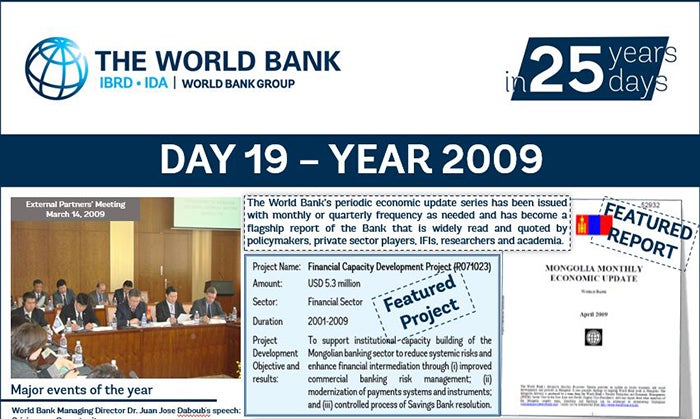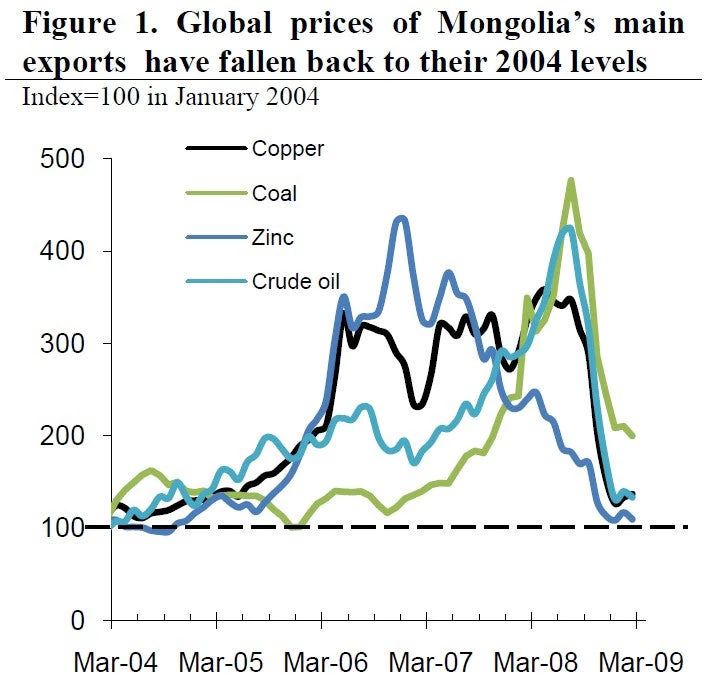
Continuing our series celebrating the 25 years since Mongolia became a member of the World Bank, today we look at 2009. The global financial crisis that began in the US the previous year hit Mongolia hard in late 2008 and through 2009, as commodity prices collapsed and economic growth turned negative for the first time since 1993. The World Bank switched from a quarterly to a monthly format for its economic updates to stay abreast of the rapidly deteriorating situation—the April 2009 edition illustrated how sharply the commodities markets had reversed in only one year.
The economic analysis helped clarify the severity of the situation, but the precipitousness of the decline called for financial support, as well. The Government reached out to partners and the World Bank, together with the IMF, Japan, and the ADB, responded with financing under a fast track facility. The first of two World Bank Development Policy Credits brought US$40 million and also called for policy reform: The program supported government efforts to improve the framework for fiscal policy, especially capital budget planning and execution, while protecting the maintenance of basic infrastructure, and to protect the poor during the downturn by retargeting social policies toward the poor. The program also sought to strengthen confidence in the financial sector, especially in banks and the regulatory structure, and clarify the mining policy framework with regard to taxation and state ownership. Further financial support, and policy reforms, would come the next year.

A very timely Public Expenditure and Financial Management Review, completed in January of 2009, urged the government “to adopt a transparent, multi-year budget framework for expenditures and investment. This includes adopting a new fiscal responsibility law. It will ensure that the government saves during the 'boom' years, so that it can continue to spend during the 'bust' years. It will also set limits to expenditure growth and public debt. Within the limits set by this framework, parliament can then exercise its constitutional rights to amend the budget.”
A planned revision of the World Bank’s strategy for Mongolia was postponed for 18 months to allow the economy to stabilize, and an Interim Strategy Note, prepared in consultation with the Government, was adopted to bridge the gap. The ISN focused on three strategic areas: improving macro and fiscal sustainability, protecting the poor and vulnerable, and encouraging transparent and prudent mining investments and a more competitive investment climate.
In 2009, the World Bank also launched a project aimed at Strengthening the National Statistical System of Mongolia (MONSTAT). In addition to providing infrastructure and equipment, MONSTAT supported improvements in the policy, regulatory, and institutional framework, the organizational structure of the statistical system and supported NSO’s strategic goal of improving efficiency and effectiveness in data collection, analysis, and dissemination processes through the use of information technology.
The year 2009 also saw an expansion in our understanding of the persistent and pernicious problem of air pollution in Ulaanbaatar, providing an initial assessment of the situation and effects of abatement measures. Based on available data from 2006 to 2008, the paper estimated the effects of pollution abatement options on ambient concentrations of particulate matter (PM), and assessed “current health damage attributable to air pollution in the city and the health benefits that can be achieved from implementing the abatement options.” Estimating the links between pollution and health problems, and then monetizing the health benefits, the report found that “the current health damage corresponds to 8.0% of the GDP in UB and 3.8% of GDP in Mongolia.” What is the maximum achievable benefit from reducing the pollution? The report estimated this to be the equivalent of 6.6% of GDP in Ulaanbaatar, and 3.1% of GDP in Mongolia.
A 2009 report on the civil service sought “to identify specific steps that the Government of Mongolia can take over the next three years to improve the performance of the civil service.” The report argued that the civil service grading and compensation system requires significant changes in order to be able to attract and retain high caliber staff; that Mongolia needs to move towards centralized payroll administration; and that “the personnel management regime needs to be improved as it presently does not fully protect civil servants from undue political interference, there is a lack of clarity over the precise recruitment modalities for the senior administrative civil service positions, and limited horizontal mobility that negatively impacts career development.”
Also in 2009, a Livestock Sector Study opened: “There are multiple perceptions and expectations of the livestock sector in Mongolia. One common perception evokes a romantic vision of nomads preserving timeless cultural practices living off the land. An alternative view of the sector regards herding as an outdated, unsustainable activity and that herders represent the outcasts from a modernizing economy, destined to remain on the land pursuing vulnerable livelihood strategies that trap them in poverty. Yet another view sees opportunities for rapid intensification of the sector and significant scope for increased productivity, increased trade and increased herder incomes in a modern livestock sector.” The report drew together “recent work on the sector to understand in greater detail what is driving the sector, and how these drivers and trends may play out in the future and what options are available in response.”
A detailed review of corporate governance noted that progress had been made in Mongolia, yet there is “a significant discrepancy between the ‘law on the books’ and corporate governance practice as carried-out by Mongolian publicly listed companies.” The report indicated that many boards manage on a day-to-day basis, rather than supervise management, that financial reporting is underdeveloped, and that basic shareholder rights are often not respected.
The year 2009 was also notable for the World Bank as the Board approved a new Access to Information Policy, “providing for disclosure of unprecedented amount of information. Interested stakeholders will be able to follow projects step by step through each stage of a project lifecycle. The new Policy includes clear procedures for making information available to the public and provides an appeal process in case access is denied to certain information.”
Next we look at 2010, and continued support in the midst of snow and smoke.
Prepared in collaboration with Tina Puntsag, Bayartulgalag Davaadorj, Boloroo Bayasgalan.
(Please follow our 25 years in 25 days journey here and on twitter with the hashtag #WBG_Mongolia25th)


Join the Conversation